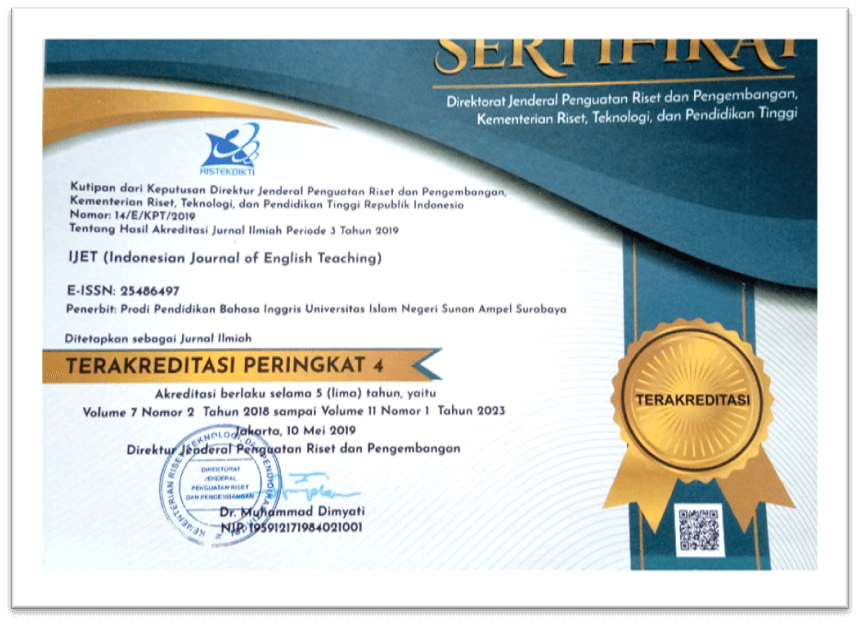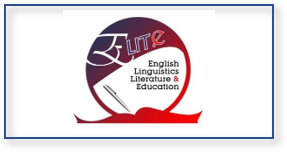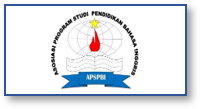Panel Discussions to Promote Meaningful Learning at Distance Education
Abstract
The present mix-method study was carried out with the purpose of promoting meaningful learning through panel discussion to enhance students´ active participation in English. It was conducted at a private university in its distance modality. The sample of the study was 52 students from different provinces of Ecuador and 2 teachers. The data-collection instruments were two questionnaires and an observation grid. These were designed to learn if the use of panel discussions promotes meaningful learning and also to identify the students’ level of satisfaction regarding the use of panel discussions. The questionnaires were applied after 8 panel discussions were held. The observation grid was used by the teachers during each panel to take notes about aspects such as motivation, comprehension, and functionality. The findings demonstrate that students’ level of satisfaction was high regarding the use of panel discussions since they helped to increase their motivation to actively participate by using previous experience with new knowledge.
Downloads
References
Abdullah, M. R., & Krishnan, S. (2014). All for One: Using Panel Discussion to Improve Proficiency Through Group Work. Procedia - Social and Behavioral Sciences, 123, 225 – 231.
Anwar, K. (2016). Panel Discussion and the Development of Students’ Self Confidence. Canadian Center of Science and Education, 9(4), 224-229.
Arju, S. (2013). A study on ESL vocabulary acquisition needs and classroom practice: a Bangladeshi context. Stamford Journal of English, 6, 54–71. https://doi.org/10.3329/sje.v6i0.13902
Arnold, K. J. (2013). Powerful Panels: A Step-By-Step Guide to Moderating Lively and Informative Panel Discussions at Meetings, Conferences and Conventions. QPC Press.
BritishCouncil.org (June 05, 2015). A Few Discussion Activities for English Language Students. https://www.britishcouncil.org/voices-magazine/few-discussion-activities-english-language-students
Cabrera-Solano, P., Gonzalez-Torres, P., Solano, L., Castillo-Cuesta, L., & Jiménez, J. (2019). Perceptions on the internal factors influencing EFL learning: A case of Ecuadorian children. International Journal of Instruction, 12(4), 365–380. https://doi.org/10.29333/iji.2019.12424a
Coll, C. (1990). Significado y sentido en el aprendizaje escolar. Reflexiones en torno al concepto de aprendizaje significativo. Barcelona: Editorial Paidós Educador.
Díaz-Barriga, F. & Hernández, G. (2002). Estrategias docentes para un aprendizaje significativo: Una interpretación constructivista. (2ª Ed.) Ciudad de México D.F.: Mcgraw-hill.
Esteban-Guitart, M., Serra, J. M., & Vila, I. (2017). Informationalism and informalization of learnings in 21st century. A qualitative study on meaningful learning experiences. Social and Education History, 6(1), 1–25. https://doi.org/10.17583/hse.2017.2111
Faust, J. L., & Paulson, D. R. (1998). Active learning in the college classroom. Journal on Excellence in College Teaching, 9 (2), 3-24.
Freyn, A. L. (2017). Effects of a Multimodal Approach on ESL/EFL University Students’ Attitudes towards Poetry. Journal of Education and Practice, 8(8), 80–83. www.iiste.org
Garrison, R., Anderson, T., & Archer, W. (2001). Critical Inquiry in a text-based Environment: Computer Conferencing in Higher Education. The Interact and Higher Education. 2 (2-3), 87-105.
González-Ceballos, I., Palma, M., Serra, J. M., & Esteban-Guitart, M. (2021). Meaningful Learning Experiences in Everyday Life During Pandemics. A Qualitative Study. Frontiers in Psychology, 12(May), 1–9. https://doi.org/10.3389/fpsyg.2021.670886
Harizaj, M. (2015). Discussions as an active learning in EFL. European Scientific Journal, ESJ, 11(16), 231 – 236.
Lin, F., Lin, S., & Huang, T. (2006). Knowledge sharing and creation in a teachers’ professional virtual community. Computers & Education. 742-756.
Lucas, J. (1984). Communication Apprehension in the ESL Classroom: Getting Our Students to Talk. Foreign Language Annals, 17(6), 593–598. https://doi.org/10.1111/j.1944-9720.1984.tb01748.x
Mansoureh, H., Saeid, Z., Sediqeh, H. & Yaser M. (2016). Critical thinking and social interaction in active learning: A conceptual analysis of class discussion from Iranian students’ perspective. Cogent Education, 3(1), 1-9.
Nel, L. (2017). Students as collaborators in creating meaningful learning experiences in technology-enhanced classrooms: An engaged scholarship approach. British Journal of Educational Technology, 48(5), 1131–1142. https://doi.org/10.1111/bjet.12549
Rahmawati, F. (2022). Investigating EFL teachers’ approaches to meaningful learning in blended-learning listening and speaking. Indonesian EFL Journal, 8(1), 91–104.
Safarnejad, M., & Montashery, I. (2020). The effect of implementing panel discussion on speaking skill of iranian intermediate efl learners. Theory and Practice in Language Studies, 10(4), 445–452. https://doi.org/10.17507/tpls.1004.14
Shahriarpour, N., & kafi, Z. (2014). On the Effect of Playing Digital Games on Iranian Intermediate EFL Learners’ Motivation toward Learning English Vocabularies. Procedia - Social and Behavioral Sciences, 98, 1738–1743. https://doi.org/10.1016/j.sbspro.2014.03.601
Sharan, Y. (2015). Meaningful learning in the cooperative classroom. Education 3-13, 43(1), 83–94. https://doi.org/10.1080/03004279.2015.961723
Shea, P., & Bidjerano, T., (2012). Learning presence as a moderator in the community of inquiry model. Computers & Education. 316-326
Szeto, E. (2014). Community of Inquiry as an instructional approach: What effects teaching, social and cognitive presences are there in blended synchronous learning and teaching? Computers & Education. 191-201.
Werdiningsih, I. (2022). Panel Discussions: Skilled Communication And Knowledge Construction to Develop EFL Learners ’ Speaking Performance. 2(1), 275–286.
Zarzar, C. (2000). La didáctica grupal. México: Editorial Progreso
Zydney, J., deNoyelles, A., Seo, K., (2012). Creating a community of inquiry in online environments: An exploratory study on the effect of a protocol on interactions within asynchronous discussions. Computers & Education. 77-87.










